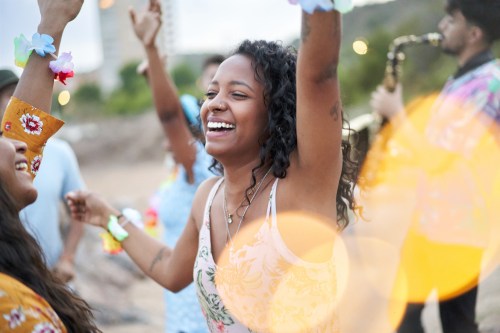Last year, Walmart launched Celebration Edition: Juneteenth Ice Cream, only to quickly pull it from its shelves. The problem was not with the ice cream itself, but with Walmart profiting off a holiday commemorating the freedom of enslaved Black people. To me, this incident clearly showed that despite Juneteenth becoming a federal holiday, its true meaning and significance remains gravely misunderstood—and that needs to change.
Juneteenth celebrates the news of the Emancipation Proclamation reaching Galveston, Texas, on June 19, 1865—two and a half years after it was enacted to free enslaved people in Confederate territories. June 19, 1866 was the first celebration, initially known as Jubilee Day, observed by newly freed Black people in Texas, and eventually in Black communities across America. I think of the meaning of Juneteenth as the day of my freedom, and that of my ancestors.
Now, two years into President Joseph R. Biden making Juneteenth a national holiday, many brands and non-Black people are still figuring out how to celebrate this important day, but many fall in the trap of performative allyship (when people and brands claim to be allied with marginalized folks but lack intent or follow-through to help dismantle white supremacy).
How to honor the meaning of Juneteenth as a true ally to Black people
Just like the rainbow-washing that often happens during Pride Month, Juneteenth-washing is an excess of marketing and branding to sell support Black people’s freedom, without the company effectively supporting its Black employees or customers. Take Walmart, which chose to make its own branded Juneteenth treat to publicly align with the holiday, rather than provide an opportunity to a Black-owned business. Because of the history of the day—and the ongoing oppression of Black people in this country—this isn’t okay; actions and words need to match when celebrating Juneteenth.
Thankfully, there are many ways for actual allies to commemorate Juneteenth. Buying Black is one of the best ways to stimulate the Black economy—crucial to promoting economic justice for our community. As Jay-Z said, “for every one Gucci, support two FUBUs” (for us, by us Black people). Feel confident supporting the featured Black-owned business at Target, but also shop directly from Black-owned businesses.
If I, a Black woman, can celebrate the 4th of July—a day that did not celebrate my freedom—a non-Black person can (and should!) celebrate a day that honors mine.
I also encourage allies to engage directly with the holiday, especially if you’re privileged enough to get a paid day off from work. Go to a Juneteenth celebration in your area to learn the history of the holiday and rejoice in the true freedom of Americans. Read a book or listen to a podcast about Juneteenth, or learn about Opal Lee, the grandmother of Juneteenth (whose tireless advocacy is the reason why we have a federal holiday for this day). Don’t make the rookie mistake of assuming that this holiday is just a “Black thing.” If I, a Black woman, can celebrate the 4th of July—a day that did not celebrate my freedom—a non-Black person can (and should!) celebrate a day that honors mine and that of all other Black people.
If you are white, use Juneteenth as a reminder of the ongoing, urgent need to dismantle white supremacy. Examine the additional power you have and how you have benefited from the enslavement of Black people in this country—and how you can play a direct part in defying and overturning the racist systems that keep Black people oppressed.
Black people: Use this day to keep celebrating yourselves and your ancestors. Although at times it feels like we are still fighting for our humanity, compared to where our ancestors were, we are free. Turn up your Spotify playlist as you grill. Be in community with other Black people at a parade, concert, or church. Use Juneteenth as a reason to celebrate how far we come and to recharge how far we need to go.
Continuing the work beyond Juneteenth
The need to uplift Black people and fight against our oppression exists outside Juneteenth. Black birthing people are still three times more likely to die due to pregnancy complications. We experience more police brutality, making up for 13 percent of the American population but representing 27 percent of fatalities by law enforcement. With the history of enslavement and abuse endured by us in this country, Black people’s pain is less likely believed in health-care settings, which contributes to health disparities.
The limited freedom we have as Black people is being jeopardized by new and existing state and municipal laws that restrict our vote, take away teaching our history in schools, and limit educating workplaces about the importance of diversity, equity, and inclusion programs. Laws are being developed or enacted that prevent the education of Juneteenth itself.
Local politics have never been more important in determining our freedoms than they are right now—which is why all allies should turn out to vote, even in off-year elections to stop the continued discrimination and unfair treatment we experience as Black people in America. And see what your city, county, state, and country is doing to ensure reparations for Black people who have been disadvantaged since July 4, 1776.
Technically, Black Americans are no longer enslaved. But this one holiday, while an important marker for how far we’ve come, doesn’t erase the oppression we continue to face—no matter how many splashy Juneteenth collabs we see on store shelves that only water down the meaning of the day. We deserve more than ice cream. We deserve true freedom.
Sign Up for Our Daily Newsletter
Get all the latest in wellness, trends, food, fitness, beauty, and more delivered right to your inbox.
Got it, you've been added to our email list.











